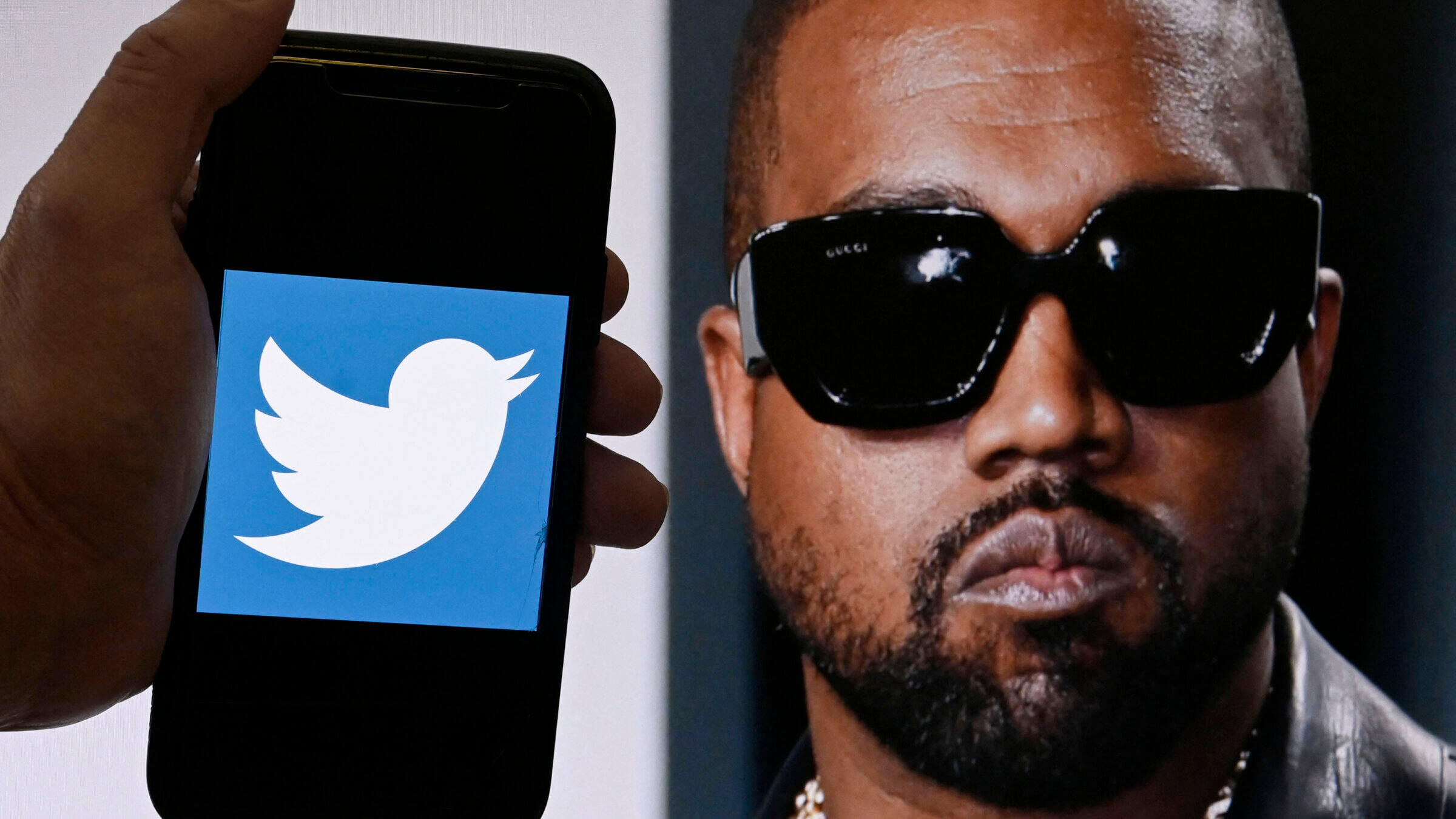Kanye’s mental health issues do not excuse his antisemitism
Bigotry leaves lasting scars, and we must hold celebrities accountable for their behavior

The Twitter logo is displayed on a mobile phone with a photo of Kanye West in the background. Photo by OLIVIER DOULIERY/AFP via Getty Images
I was 8 years old when I found the fort my brothers and I had built in our backyard covered in bright red swastikas.
We were living in Troy, New York, at the time — a rough-and-tumble town just outside of Albany. Back then, I didn’t know what those symbols really meant. But when I saw the pain in my father’s eyes at the sight of them, I felt his pain, and it ran deep.
This would not be the last time my family and I were targeted because of our faith. At the age of 11, a student in my sixth grade class ran up to me in the hall at school and tossed pennies at me.
“Pick them up, Jew! You Jews want money,” he said.
I was confused and angry. I told the principal, and the student was disciplined. But that didn’t stop him from launching verbal attacks at me under his breath at every opportunity: making fun of Hebrew school and the yarmulkes Jews wore, and hurling racial stereotypes. I began to believe that most people in this world felt the need to lash out at Jews simply because we existed.
In Viola Davis’ book “Finding Me,” she describes how the actor Will Smith asked her, “Who are you?” He explained that somewhere inside, he was always going to be that 15-year-old boy whose girlfriend broke up with him. Davis blurted out, “I’m the little girl who would run after school every day in third grade because these boys hated me because I was not pretty. Because I was Black.”
Painful events shape who we are and who we become. I know from experience that being bullied as a child has lasting effects. You can either channel that pain into something positive, or you can let it cripple you.
My family was incredibly close and supportive, and through them, I was able to channel this bigotry into a strong desire to help people. It enlarged my humanity.
The same thing that anchored me was the same thing the bullies tried to use against me: my Jewish faith. My father, a paratrooper in the U.S. Army, instilled in me from an early age that to be Jewish is a privilege. We understand what it’s like to be persecuted — and we persevere. Our ultimate calling is informed by our lived experience as Jews — and extends far beyond. It is the ethic of non-indifference, of speaking out and speaking up for all.
Today, antisemitic attacks not only continue, but are also amplified by social media. When someone with a powerful platform like Kanye West says he’s going to go “death con 3 on Jewish people,” he is inviting and inspiring yet another wave of hate.
Remember, bigotry can be incremental and build up slowly, as it did in the 1930s. Many are pointing to mental illness as an excuse for Kanye’s words and actions, but mental illness and bigotry should never be conflated.
I have family members who are bipolar; their caring, compassionate and kind core character remains unchanged. Even if Kanye’s behavior is somehow related to his mental health, he should not get a pass because of it. We must hold him and others to account by calling them out and uniting against such rhetoric. We can choose not to give them our dollars, and instead donate to causes that help combat hate speech, like the Anti-Defamation League or similar organizations. I applaud corporations like Adidas for denouncing his hate speech and cutting financial ties with him — and I believe the companies and platforms that continue to profit alongside him are complicit.
The U.S. is divided as much as it is obsessed with the cult of celebrity, and hate speech fueled by industry elites only aids in fanning the flames of divisiveness. Words matter. Consequences matter. Bullying and racism are not forms of mental illness, but rather a deep moral crisis. These things are not innate; they are learned. They can also be unlearned through education.
Dismissing someone’s inexcusable behavior as a mental health problem makes it far too easy for them to retreat into their own depravity. They must face the consequences and do the work. Bigotry can only grow in a bubble — and it is up to all of us to call it out.
To contact the author, email [email protected].





















